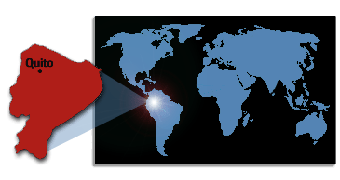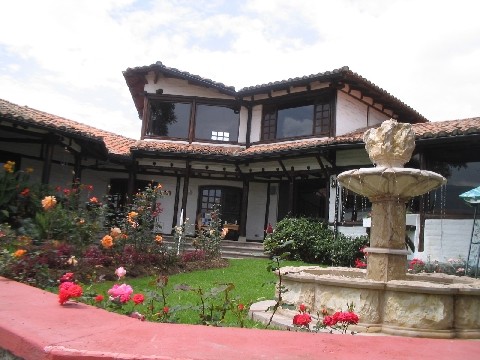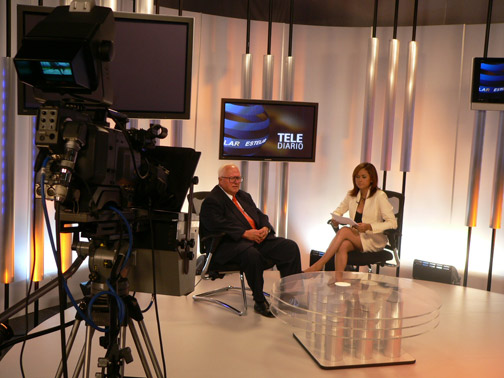Mood:
Topic: Who, What, Where, Why
The purpose of this Blog is to record our
experiences in retiring in Quito, Ecuador.

We had lived and worked here during
1974-79 and loved it. We dreamed of
returning and we came back again after
a quarter century to work here in 2004
with plans to retire here where the work
ended. To that end we bought our
retirement home on our return. Jim's
Jim's
Ecuador project
ended in June,
2006 and after
three months in the US we returned to
retire here arriving on September 16,
2006. It was nice to retire to the already
furnished home and have our two
female Chihuahuas we had originally
brought from Mexico happy to meet us.
They were especially happy because we
brought along a male Chihuahua. This
posting will try to cover the experience of
retirement here up to now. Later we'll
continue to add postings. And we'll try to
keep them concise.
WHO - We are Jim and Lea Wesberry
originally from Atlanta, Georgia and
Quivilla, Peru respectively. We have
been married for 32 years and have
grown children scattered across the USA.
Jim's father was a well known Baptist
Minister in Atlanta. Lea's family lived
high in the Andes in a remote agricultural
environment. Jim went to Peru with the
Alliance for Progress in 1967.
WHAT - We chose to retire in here for a
number of reasons...friendships from
years past, the world's most beautiful
country, a climate that is never very hot
or very cold and many other reasons.
WHERE - We are located about 15
miles below the Ecuator in a beautiful
valley about 1,700 feet below Ecuador's
historic capital city of Quito and have a
bit less than a acre of land in an area
that was rural but is rapidly being built
up. Land here is measured in hectareas,
not acres. A fifth of an hectarea is a
"quinta" and this term is used for small
rural homesteads. Thus we named our
place "Quinta Quivilla"
WHY - We decided against retiring in the
US due to the high cost and the varied
weather conditions and against Peru due
to the history of violence caused most
recently by the Sendero Luminoso
terrorists.
Also Lea’s mother who is physically
incapacitated by osteoporosis lives with
us and is no longer in a condition to be
moved.
The First Year – They say that the first
year of retirement is the most difficult.
We would agree. Getting used to not
working is as hard as getting used to
working. (Of course, Lea is not retired,
she still works full time managing Quinta
Quivilla, comments on retirement are
really only Jim’s).
We found our place in great condition
when we returned after three months in
the US. The flowers and plants were
beautiful and the animals were all in
good health. Lea’s niece, Flor, had taken
good care of her
grandmother and
her father, Ruben,
had popped up
frequently from Lima to see her and
help.
Jim fulfilled a prior commitment to be
keynote speaker at the second annual
Ecuadorian Encounter on Recovering
Values in October. He had spoken at the
first event the previous year.
He also spoke on values at the 44th
Anniversary of Ecuador’s national airline,
TAME, in December. Other than these
and attending a few professional
sessions of auditors and accountants, it
was all rest and relaxation for Jim during
the remainder of 2006 (but not for Lea
who remained very busy as usual).
The big event of the year 2006 was the
marriage of our youngest son, Perry, to
Lorena Castro of Quisapincha, Ecuador.
Perry had visited us quite a few times
more than normal since we moved to
Quito and it turned out that he was more
interested in Lorena than us. She is an
English major and teaches English at
elementary schools. She continued in
college and will graduate in late 2007.
They fell in love and were married in a
traditional Ecuadorian civil ceremony at
our home. The weather cooperated and
it was a beautiful and unforgettable
event with about 50 persons present,
mostly Lorena’s family. As a result our
family took a great leap in size. Now
between Lea’s family in Peru (and the
US, twelve have emigrated legally so
far), Lea’s brother, his wife, Jacqueline’s
family and Lorena’s family here in
Ecuador we have more Latin American
than US family members.
At Christmas, 2006, we had with us only
Perry, Rubyli and her husband, Joey, but
Jonathan came for his brother’s big
wedding on a flash visit.
Things calmed down for the first part of
2007. We got to know Lorena’s family
better and really like her grandparents
who are in their 80’s and own a small
farm near Quisapincha where Lorena
grew up. Coincidentally Quisapincha is
nearly at the same altitude as
Quivilla, Peru, where Lea grew
up, almost 10,000 feet. Both are very
tiny places but Quisapincha is on a high
plateau overlooking the larger city of
Ambato, Ecuador while Quivilla is deep
down in a valley in the Huanuco Province
on the great Marañon River between
towering mountains. The Marañon later
flows into the Amazon.
At Quisapicha we especially enjoyed
two occasions: the harvesting of
potatoes by hand on Lorena’s
grandfather’s (see photo)place and the
annual bull spectacular in the town.
This latter was not a bull fight as is the
custom in the big cities, but just a big
celebration where local bulls were
brought into an arena and local young
folks tried to provoke them. These
annual events are common in Ecuador
and Peru and feature one or more local
bands playing native music, colorful
dancers and usually some young
valiant gets hurt by the bulls. Unlike bull
fights, the bulls themselves never get
hurt.
During the potato
harvest a group of family
and friends gather and
after the ground has been loosened by
hoeing, they form a line across the field
squatting or kneeling and gradually
scratch out the fresh potatoes by drawing
their open fingers through the loose
earth. It is quite an occasion with lots of
happy talk, joking and singing. Lea
especially enjoyed it, as did her niece
Flor, as they do similar harvesting in
Peru, but slightly differently as to filtering
the soil manually.
Jim has spent much time this year
catching up on his reading of non-
professionally related books including
biographies, histories, historical novels
and classics. His exercise consists of
swimming at least an hour each day in
our solar heated pool.
In May Lea and Jim went to Panama
where Jim did some work for the USAID
Anti-Corruption project there including
three speeches and several press and TV
interviews.
We were surprised at the new
skyscrapers going up and the obvious
rapid development of Panama into the
Hong Kong of the Western Hemisphere.
Panama is now said to be the best
overseas retirement place for Americans.
We still prefer Ecuador.
